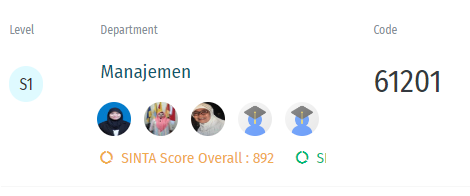Pengaruh Literasi Keuangan, Gaya Hidup, dan Pendapatan Terhadap Pengelolaan Keuangan Pribadi Karyawan Gen Z Kota Makassar
Keywords:
Financial Literacy, Lifestyle, Income, Personal Management, Gen ZAbstract
This study aims to analyze the influence of financial literacy, lifestyle, and income on personal financial management of Generation Z employees in Makassar City. The approach used in this study is quantitative with primary data obtained by distributing questionnaires to 96 respondents. Data analysis was carried out using descriptive statistical methods and Structural Equation Modeling-Partial Least Squares (SEM-PLS) using the SmartPLS 4 application. The results showed that financial literacy and lifestyle did not have a significant effect on personal financial management, as indicated by the t values of 1.669 and 0.915 (<1.96), respectively. In contrast, income has a significant effect on personal financial management with a t value of 5.572 (>1.96). This finding indicates that income level plays a greater role in financial management than financial literacy or lifestyle. Therefore, a strategy is needed to increase awareness of financial literacy and better lifestyle management for Generation Z to improve their financial independence.References
Badan Pusat Statistik Indonesia. Jumlah Penduduk Menurut Kelompok Umur dan Jenis Kelamin. Https://Www.Bps.Go.Id. 2020. p. 1.
Halik JB, Halik MY, Latiep IF, Irdawati, Balaba E. Pengaruh Literasi Keuangan, Gaya Hidup, Dan Uang Saku Mahasiswa Dalam Pengelolaan Keuangan Pribadi Pada Mahasiswa Universitas Kristen Indonesia Paulus Makassar. Account Prof J [Internet]. 2022;5(1):51–67. Available from: https://ojsapaji.org/index.php/apaji/article/view/99
OJK. Ojk.Go.Id. 2021 [cited 2024 Dec 12]. p. 1–130 Strategi Nasional Literasi Keuangan Indonesia (SNLKI) 2021 - 2025. Available from: https://www.ojk.go.id/id/berita-dan-kegiatan/publikasi/Pages/Strategi-Nasional-Literasi-Keuangan-Indonesia-2021-2025.aspx
IDN Research Institute. Indonesia Millennial Report 2024 [Internet]. 2024. Available from: https://cdn.idntimes.com/content-documents/indonesia-millennial-report-2024.pdf
Mongan CJ, Sapan A, Monda N. The Influence Of Financial Literacy And Lifestyle On Decisions To Take Credit At PT. BPR Hasamitra Makassar. J Entrep BUSINESS, Manag [Internet]. 2023;1(2):76–89. Available from: https://journal.amkop.id/jebm/article/view/45/40
Singarimbun, M & Effendi S. Metode Penelitian Survei. Jakarta: LP3ES; 2008.
Sugiyono. Metode Penelitian Bisnis: Pendekatan Kuantitatif, Kualitatif, Kombinasi, dan R&D. Edisi 3. Bandung: Alfabeta; 2017.
Susilana R. Metode Penelitian Sosial Kuantitatif. J Vis Lang Comput. 2015;11(3):287–301.
Hair JF, Risher JJ, Sarstedt M, Ringle CM. When to use and how to report the results of PLS-SEM. Eur Bus Rev. 2019;31(1):2–24.
Haryono S. Metode SEM untuk penelitian manajemen dengan AMOS LISREL PLS. Luxima Metro Media. 2017;450.
Santosa PI. Metode Penelitian Kuantitatif. 1st ed. Yogyakarta: Penerbit ANDI; 2018. 308 p.
Ghozali, Latan. Partial Least Squares, Konsep Teknik dan Aplikasi Menggunakan Program SmartPLS 3.0. 2nd ed. Vol. 1. Semarang: Badan Penerbit Universitas Diponegoro; 2015. 77–83 p.
Pujiastuti H. Peran Literasi Keuangan dan Leverage Dalam Penentuan Kualitas UMKM dengan Anggaran sebagai Variabel Moderasi. J Ris Akunt dan Audit. 2023;10(1):61–76.
Hair JF, Howard MC, Nitzl C. Review of Partial Least Squares Structural Equation Modeling (PLS-SEM) Using R: A Workbook. Vol. 30, Structural Equation Modeling: A Multidisciplinary Journal. 2021. 165–167 p.
Tamara K lorenza the, Jaya A, Halik J baptista. Pengaruh Social Media Marketing dan Sales Promotion Terhadap Keputusan Pembelian Tastea Perintis Kemerdekaan Makassar. J Ekon Islam. 2023;19:112–31.
Ghozali I. Partial Least Square: Konsep, Teknik dan Aplikasi Menggunakan Smart PLS 3.2.9. 3rd ed. Semarang: Universitas Diponegoro; 2021.









